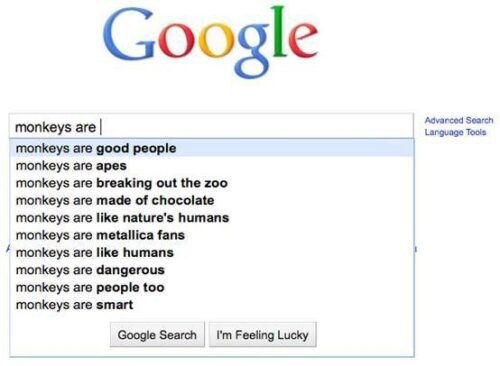
Courtesy of Search Engine People
If you’ve ever done a Google or any type of online search before, you may have encountered something similar to the above post. How does Google generate these suggestions? According to Search Engine Land, there are a few components. These include overall searches (things people around the world have typed in), your own search history, and regional suggestions.
So, Google and other search engines have methods for anticipating what people are looking for and delivering relevant results.
How do you get your website to show up in searches? That’s where SEO and keyword research comes in. According to Techopedia, a keyword “is a particular word or phrase that describes the contents of a Web page.” Having the right keywords on your website helps get your material to the right people when they search for certain words/phrases. How do you know if your words/phrases are “right”? There are a few pieces to that puzzle.
One part, which may seem like common sense, is that you want keywords that match the content on your website. For instance, it wouldn’t make a lot of sense to use “Barnum & Bailey Circus” on our Breaking Even Contact page. It’s not accurate and probably won’t get us any traffic. (Spammers tend to use popular words to get traffic to their spammy sites so search engines will penalize you for what they consider a mismatch between what you say is on your website and what is actually there.)
Once you determine what’s relevant, another piece of a “right” keyword is what your target audience/people who are interested in what you’re offering. Just because you think people are using certain search words doesn’t necessarily mean they are actually using those words. A lot of times, business owners have more industry knowledge and might assume others are using more jargon-y terms to reach their website. To reconcile these potential discrepancies, keyword research comes in, and that’s where things can get a bit…silly.
Earlier this month, I had the pleasure of doing keyword research using a website called SEO Profiler. This is a paid service that has several tools, including keyword research. The keyword suggestion tool lets you type in a word or phrase, and then suggests other search terms based on number of local searches (based on an area you pick out, ‘local’ for us is United States) and competition (how many other websites are using the keyword). One of the more interesting words that I discovered was ‘whales.’
The results for ‘whales’ was very similar to some of the aforementioned Google autofill fails. Since SEO Profiler (and other keyword research tools) are basing their information on what people are searching for, this yields some pretty interesting results. My top 10 (there were HUNDREDS of hilarious results):
- Prince of Whales
- Whales the country
- Why do whales beach themselves
- Whales with legs
- Blackfish
- Why is a humpback whale called a humpback whale
- Do whales fart
- Do killer whales kill
- Can whales drown
- whales tale (<–apparently this is a water park in New England)
So, when you’re thinking about keywords, remember: relevance (is it on your website and a phrase people are actually searching), accuracy (is it what your people are searching for), and value (are people looking to ‘buy’ what you are selling when looking up that word).
The fun factor was one of the pleasant surprises to be found in keyword research, but entirely optional.
